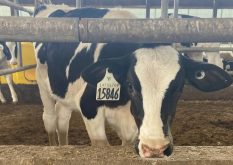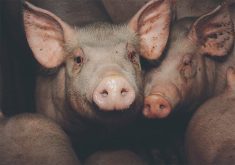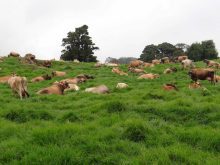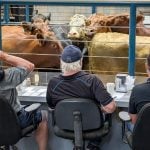“Safe” is such a sticky word in agriculture these days. More and more, it seems consumers want to know that their food is “safe” (whatever that happens to mean at any given moment), and producers want consumers to know their food is safe, regardless of how it’s produced.
For consumers, though, it’s all about perception, and they seem to equate “safe” with small, local farms that follow a certain set of production practices.
As a result, we’re seeing growing demand for “ethically raised” meat and poultry, despite the fact that stringent government regulations guarantee the safety of the animals. We’re seeing growing demand for a return to the “small family farm,” despite the fact that most farms in Canada have been built and are managed today by families. We’re seeing growing demand for “local foods,” despite the fact that you can’t drive a few miles out of any town or city without hitting a farm.
Read Also

Alberta Beef Producers gives update on potential withdrawal from CCA
Alberta Beef Producers chair Doug Roxburgh discusses ABP’s plan to leave CCA during a producer’s meeting.
Producers are justifiably concerned about these contradictions. It’s frustrating to see consumers drawn in by misinformation and fearmongering.
But consumers are right to be concerned as well. Most farms in Canada have a great track record when it comes to things like quality and safety, but once that product leaves the farm, it’s out of the farmers’ hands. In some cases, that means a whole product — like lentils — is exported overseas, repackaged, and then sold back to Canadians as a product of another country. In other cases, it means that people get sick or even die from eating improperly handled beef or vegetables or dairy products.
For consumers who want to know where their food comes from, the process that brings their food from farm to fork can be, at best, confusing and, at worst, alarming. As a result, some consumers — not all, not even the majority, but some — want to know the person behind the product.
I would argue that’s good for business.
And I think some would agree. McDonald’s and Ocean Spray have been using farmers in their commercials for years. Even Alberta Beef Producers used personal stories of local ranchers beautifully through their Raised Right campaign a few years back.
I may not agree with their methods, but A&W is giving consumers the connection to primary producers that they crave. By sourcing beef from only three operations, A&W is standing behind their products in a way that few other fast-food joints have ever done. And while there may not be anything “better” about A&W’s beef, consumers respond to that kind of confidence.
How, then, can the agriculture industry create that same kind of confidence in consumers?
Well, getting angry won’t do it. Calling for boycotts won’t do it either. Defensiveness doesn’t instil a whole lot of trust.
There’s no simple answer for this. As an industry, we need to advocate for science-based decisions — but we can’t do it in response to a marketing campaign. We need to advocate for the safety and quality of the food we produce — but we can’t do it at the expense of businesses or farmers who have chosen a different way of doing things for their operations. We need to advocate for our farms and our industries — but we can’t do it to defend our farms or industry.
Only then can we create a meaningful dialogue with the fellow Canadians we, as an industry, work to feed.














